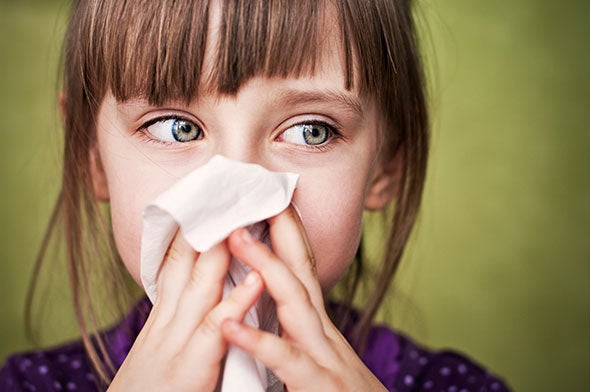Itchy Icky Allergies: Overcoming Seasonal Ailments
March 4, 2024
By: WakeMed Health & Hospitals
Categories: Primary Care
When spring is in the air, bursting in all its pastel glory, allergens also erupt, leading to misery for sufferers. How could a season that brings so much beauty, also bring so much misery?
Allergies occur when the body’s immune system sees a certain substance as harmful. It reacts by causing an allergic reaction. Allergies are a common health condition, affecting millions of people around the world.
Substances that cause allergic reactions are allergens.
If stuffy allergies have you thinking you're alone in the fight against this pesky misery, think again. There are many types of allergies. Some allergies are seasonal and others beat you down year-round. Some allergies may be lifelong, while others pass with time. They occur when the body's immune system reacts to a substance that is normally harmless, such as pollen, dust or certain foods. This reaction causes a range of symptoms, from mild discomfort to severe, life-threating reactions.
Classic Allergic Reactions
Allergens can attack many bodily systems, resulting in a wide array of reactions. Classic symptoms involve skin reactions and generalized reactions.
#1 – Skin reactions
The most common form of this is hives.
#2 – Generalized Allergic Reactions

Generalized allergic reactions can involve many bodily systems. Hives are usually present and may include the following:
- coughing/sneezing
- cramping abdominal pain
- diarrhea
- fainting
- fall in blood pressure
- itchy and watery eyes
- nausea
- runny nose
- shortness of breath
- skin rashes
- throat and mouth swelling
- vomiting
- wheezing (a whistling, squeaky sound when you breathe)
These symptoms can greatly impact a person's quality of life, making it difficult to sleep, concentrate and navigate daily life.
#3 – Serious Reactions
Allergies can also lead to more severe conditions, such as asthma, eczema and anaphylaxis.
Other Immunologic Responses
There are other ways (that are not a classic allergic reaction) the immune system may react. For example, antibodies can destroy red blood cells. This destruction of red blood cells can cause anemia.
Allergy Treatment
It's important to work with your health care provider to create a plan to manage your allergies, so you can embrace the changing seasons and lead a full life. Sound allergy treatment is based on your medical history, the results of your allergy tests and the severity of your allergies.
Potential treatments include the following:
- Allergen avoidance
- Medication management (over-the-counter and prescription)
- Immunotherapy (allergens given as a shot or placed under the tongue)
How to Avoid Allergens
The best way to prevent symptoms and limit your need for allergy medicine is to avoid your allergens as much as possible. This includes removing the source of allergens from your home and other places you spend time. You can also reduce your symptoms to airborne allergens by washing your nostrils with a nasal saline rinse using a squeeze bottle or a Neti pot.

Medications for Allergies
Some people don’t take allergy medicines because they don’t think their symptoms are serious. They may say, “It’s only my allergies.” This can result in painful problems, such as sinus or ear infections. Don’t take the risk. Many safe prescription and over-the-counter medicines are available to relieve allergy symptoms, and these medications are just a sniff away.
Here is a short list of allergy medicines:
Nasal corticosteroids are nose sprays.
- Nasal corticosteroids reduce swelling. Swelling causes a stuffy, runny and itchy nose. They are the most effective medicines for nasal allergies.
Antihistamines block histamine, a trigger of allergic swelling.
- They can calm sneezing, itching, runny nose and hives. They come in pills, liquids, melting tablets or nose sprays. These treat seasonal and indoor allergies.
Mast cell stabilizers keep your body from releasing histamine.
- This can help with itchy, watery eyes or an itchy, runny nose. They are available as eye drops or nose sprays.
Decongestants reduce stuffiness by shrinking swollen membranes in the nose.
- Be careful! Using these sprays more than three days in a row may cause the swelling and stuffiness in your nose to get worse. This can happen even after you stop using the medicine. This reaction is a rebound reaction.
Corticosteroid creams or ointments relieve itchiness and stop the spread of rashes.
- See your doctor if your rash does not go away after using this cream for a week.
Oral corticosteroids may be prescribed to reduce swelling and stop severe allergic reactions.
- These medicines can cause serious side effects. Expect your doctor to carefully monitor you while taking it. Oral corticosteroids are not the same as anabolic steroids used illegally by some athletes to build muscles.
Epinephrine (ep-uh-NEF-rin) comes in a pre-measured and self-injectable device.
- It is the most important medicine to give during a life-threatening anaphylaxis (severe allergic reaction). To work, you must get an epinephrine shot within minutes of the first sign of serious allergic reaction. It treats life-threatening allergic reactions to food, stinging insects, latex and medications.
Available Immunotherapy Treatments
Immunotherapy is a treatment option for some allergy patients. There are two common types of immunotherapy:
- Allergy shots
- Sublingual immunotherapy (SLIT)
Allergy shots involve giving injections of allergens in an increasing dose over time, so you can beat them at their own game by becoming progressively less sensitive to that allergen. Allergy shots can work well for some people with allergies to pollen, pets, dust, bees or other stinging insects, as well as asthma. Allergy shots do not usually work well for allergies to food, medicines, feathers, or for hives or eczema.
Relief is Out There
Allergies can have a significant impact on a person's physical and emotional well-being, and it is crucial for individuals to seek proper medical care and support in managing their allergies. With proper management and awareness, allergies can be effectively controlled, allowing sufferers to live a full and healthy life.
WakeMed has many specialists who can help you find relief from allergy symptoms. Check out our many services below and breathe easy knowing that we can help you control your allergies, so your allergies stop controlling you.
About WakeMed MyCare 365
At WakeMed MyCare 365 we offer the ultimate in convenience. With locations around the Triangle open every day of the year, our care teams are available to see you whenever and wherever you are. And if that’s still too far away we offer virtual visits. Just select your location and call to schedule your visit. Each of our locations offers walk-in urgent care services along with primary care, so you can get the type of care you need any day of the year.
About WakeMed Children’s – Pediatric Primary Care
We are proud to offer exceptional, compassionate pediatric care to families throughout Wake and Johnston counties. WakeMed Children’s wide range of pediatric care includes annual well visits, sick visits and comprehensive pediatric physical exams. Our team of pediatricians in Cary and Clayton offer the most comprehensive services for children in Wake and Johnston counties.
About WakeMed Primary Care
WakeMed Physician Practices features board-certified primary care, internal medicine and family medicine physicians conveniently located throughout the Triangle.
Our exceptional and compassionate providers and care teams pride themselves on developing long-term relationships with their patients and their families.
About WakeMed Urgent Care
WakeMed Urgent Care offers a wide range of adult and pediatric services for patients ages 4 months and up with multiple locations and specialty services to serve you.